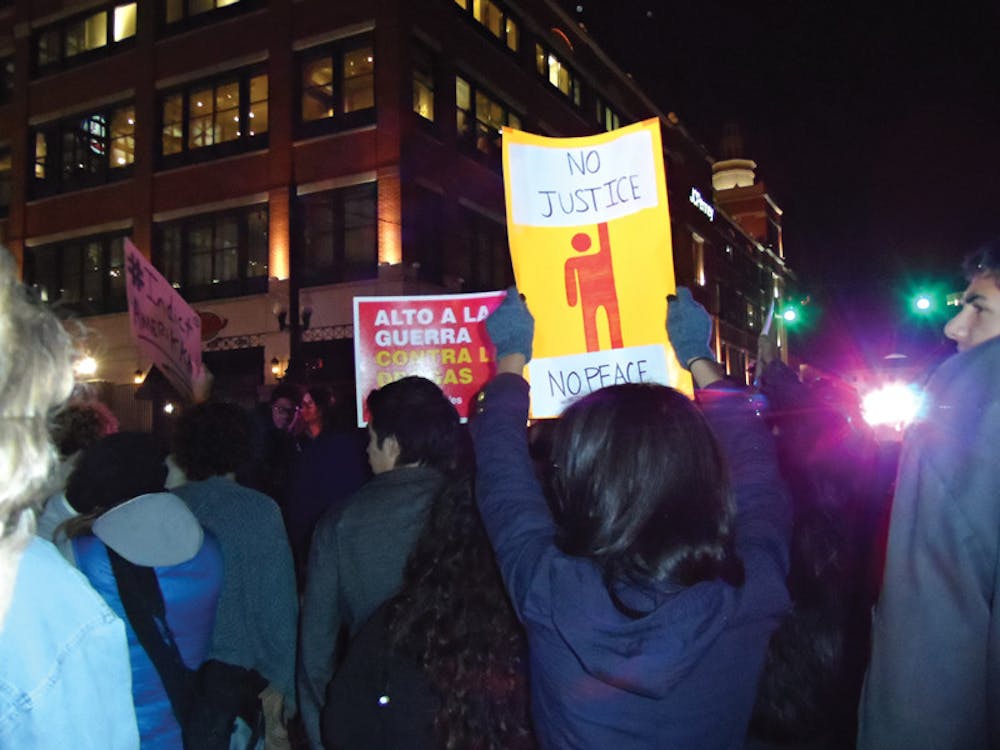Despite cold and rainy weather, more than 100 community members gathered Monday night at Burnside Park in downtown Providence to join a nationwide movement protesting police violence.
The event, advertised on Facebook as a “March Against Police Violence in Solidarity with Ferguson and Mexico,” aimed to protest the militarization of police and recent acts of violence by officers such as the fatal August shooting of teenager Michael Brown by police officer Darren Wilson in Missouri and the disappearance of 43 students at the Raúl Isidro Burgos Rural Teachers’ College of Ayotzinapa in Iguala, Guerrero, Mexico.
The organizer of the event, Rebecca McGoldrick ’12, executive director of the local nonprofit Protect Families First, reached out to Amy Espinal, a lifetime resident of Providence, to spread the word about the event.
They aimed to advertise the event to residents who were “thrown off by some of the aspects of last week’s demonstration,” when six people were arrested after protestors forced officials to temporarily close off Route 95 North, Espinal said.
“We meant to have something that was more peaceful, so that those who did have an issue with certain aspects of (last week’s demonstration) would perhaps listen and understand our grievances,” Espinal said.
Espinal said she believes the protest would have unfolded differently had protesters worked with the National Association for the Advancement of Colored People, the Urban League and Direct Action for Rights and Equality beforehand.
Espinal called on the organizations to provide “constructive criticism” of inexperienced protestors, she said.
Police officers patrolled along the protesters’ paths and guided oncoming traffic during Monday’s march, which covered a little under a mile and ended at the Statehouse with no one harmed or arrested.
“Like my mother says, you get more with honey than with vinegar, so this is my attempt at that,” Espinal said.
Reuters reported Nov. 26 that more than 400 people have been arrested at similar protests around the nation. The protests in Ferguson were reported to have included looting and arson, which led Missouri Gov. Jay Nixon to deploy 2,200 National Guard troops to surround the area.
Though Maya Finoh ’17 does not support the violent acts that may occur during protests, she said she believes they are “manifestations of frustrations of black people” that should be heard.
“Since the onset of this country, black people have been labeled as three-fifths of a person,” Finoh said. “Black people for the past 400 years have been systematically oppressed, and we’re more worried about black people expressing the pain and policing that pain than the greater system of racism.”
Finoh said people should worry less about these “manifestations of frustrations.” Instead, “let’s worry about mass incarceration, let’s worry about police brutality, let’s worry about how every 28 hours an unarmed black person is murdered by the police.”
Julio Aragon, president of the Mexican-American Association of Rhode Island and the Cesar Chavez Committee of Rhode Island, marched in solidarity with the families of the 43 Mexican students who went missing at the beginning of September and their families to “send a message to the Mexican government to end brutality,” he said.
Aragon joined in criticizing Mexican President Enrique Peña Nieto for waiting too long to comment and act on the disappearances.
“He needs to make a lot of changes inside his government because the corruption is really too much,” Aragon said.
Protesters in Mexico have signed petitions calling for Peña Nieto’s resignation, but Aragon believes a resignation would only cause more turmoil and Mexicans “aren’t ready for that,” he said.
Aragon said the police brutality in Ferguson was “the same but on a different level” than that in Mexico, he said. “On both sides they kill people.”
“At least here we have real legal representation. In Mexico, we are forgotten,” Aragon added.
Providence resident Jared Paul sported a “#FilmThePolice” t-shirt at Monday’s protest. He marched for both causes because of what he believes to be an “epidemic of folks of color being stopped, frisked, detained, harassed, beaten, maimed, jailed, imprisoned, tortured and killed by police,” he said.
“There is an inherent and systemic racism that most white people aren’t even aware exists,” Paul said.
Paul attributed the power of recent movements to social media, which “has been dominating and democratizing the news, so the world is getting more reminders” of these incidents, he said.
“I want to impress upon people that it’s not enough for white people to not be racist,” Paul said. “You have to be actively anti-racist.”
A previous version of this article misstated the name of an organization cited by Amy Espinal. It is Direct Action for Rights and Equality, not Drug Abuse Resistance Education. The Herald regrets the error.

ADVERTISEMENT




